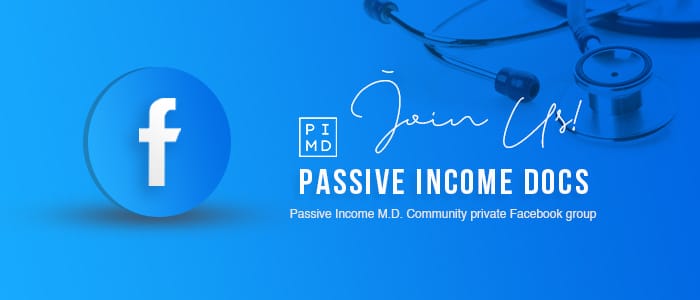
Side Gigs for Pre-Med and Medical Students
This post may contain links from our sponsors. We provide you with accurate, reliable information. Learn more about how we make money and select our advertising partners.
We've got a little bit of blog post-inception on the blog today, folks! Part of why I love this blog so much is because I not only get to share my own thoughts on the blog, but I also get to share the wealth of knowledge out there from other people on my blog as well – especially from the blogs of my trusted friends and colleagues.
The Physician on FIRE had a guest on his blog, Bryan Miles, who shared some of his most successful side hustles during his time as a pre-medical and medical student. Bryan made tens of thousands of dollars to minimize his debt through these gigs, all while ensuring he wasn't taking time away from his education, his friends and family, and his well being. That's pretty amazing. Take a look below to learn how he did it!
Today’s Classic is republished from Physician on FIRE. You can see the original here.
Enjoy!
Bryan Miles of Bryan’s Black Bag reached out to me and asked if he could share a guest post detailing some of the side gigs and hustles he’s had in his six years as a pre-medical and medical student.
I read his post and said, “absolutely!”
With some outside the box thinking, Bryan has been making choices to minimize his debt and maximize his future net worth long before many of us started thinking about such terms.
Normally, I would discourage most pre-meds and medical students from doing anything but focusing on their studies and their patients, but Bryan doesn’t describe anything that would take away from those endeavors. And he’s made tens of thousands of dollars, which to me, is astounding.
Let’s hear from Bryan, who happens to attend the same medical school as my maternal grandfather (although it was called Marquette University back when he graduated from the medical school in 1929). Tell us about yourself and your side gigs, Bryan!
Hey all! My name is Bryan Miles and I am a rising MS3 at Medical College of Wisconsin. Like many of you, my journey too, and now through, medicine has been fraught with frustrations and disappointment, but also satisfaction and elation. The medical hierarchy, while intimidating at times, truly has a pay it forward attitude with respect to education. Therefore, I am sharing my successes and failures with you, both professionally and personally, to allow you to have more of the former and less of the latter.
Side Gigs for Pre-med and Medical Students
College and medical school are expensive, especially private institutions. Obviously, your first priority is school and building your resume, and then I would recommend focusing on family members, friends, and your own personal well-being. If, and ONLY if, all of that is in order, then perhaps you may be interested in one of the following side hustles. Here are some of the things I have managed to fit into my hectic, demanding schedule.
Overnight Asleep Shifts
These are absolutely hidden gems. I had a friend enlighten me as to their existence in the first place and am forever grateful. What is better than getting paid to sleep? I figured this was too good to be true, but am thrilled with the results.
During my first year of medical school, I slept forty hours a week at a group home. This translated to four ten hour shifts, each starting at 10 pm and ending at 8 am. I was actually only awake from 7 am to 8 am, doing things like making breakfast or packing lunches. So, in total, I was only awake 4 hours each week of “work.”
The remaining time I truly slept or studied. Facilities like this need around the clock supervision and odds are there will be one and demand near you if you reside in a big city. You will need to feel out the group home residents though. If they are runners, good luck getting sleep.
My second year of medical school, as courses got my demanding, I went down to two shifts a week, or twenty hours. There was also a new group home resident this year with a sad story. He suffered from fetal alcohol syndrome and was non-verbal. His only way to communicate consisted of screaming. This made sleep harder to come by, but it did happen and other nights I simply powered through.
Ultimately, if you explain your situation to the interviewer and say that you are paying your way through school and actually need to sleep during the shift, they can give you the low down on the residents. Chances are, there are pretty cushy gigs out there, but you need to define that for yourself.
All in all, I have netted close to $30,000 (at $10/hour this breaks down to $19,200 my first year and $9,600 my second year) pretax, and since I am basically at the poverty line, this is essentially my post-tax earnings as well.
Landlording as a Student
There is a very big upside to this one, but also the possibility for a financial disaster. That being said, you really, really need to do your homework. This largely boils down to location, location, location.
Honestly, I would not buy a place in hopes of selling it down the road after it has appreciated. Even realtors, who are experts, struggle to predict housing trends. Therefore, why would you be able to? Instead, the smart play is to turn it into a rental.
There are definitely some hurdles to overcome upfront, mostly getting approved for a mortgage, which may require some help from others in a more financially secure position. If they are generous enough to co-sign that is awesome, but even helping with the down payment will go a long way.
Ultimately though, it will boil down to the ratio between your income and debt, which the bank calculates. Ever since the housing crisis, they do not really budge much on these numbers. However, if you clear their inspection, then you are off to the races.
Why is that? Well, unless you buy something well outside your means, your mortgage will very likely be equivalent to or less than what you would have been tossing away in rent. Building equity versus burning rent money is huge! Beyond that though, if you have roommates, they are effectively paying your mortgage for you. [PoF: This is sometimes referred to as house hacking]
Then, upon moving out, if your pursuit of medicine takes you elsewhere, tenants continue to pay your mortgage for you. This is where you really have to do your homework, though.
You need to focus on two things. First, is the location enticing to potential renters (also who are your potential renters)? Second, what will your cash flow look like each month?
Your cash flow is what you net after your expenses. So, basically your rental income minus your mortgage and other expenses, like homeowners association fees (if applicable), private mortgage insurance (something you pay if you put down less than 20%), homeowner’s insurance, and so on. It is imperative you anticipate all of the expenses, otherwise your cash flow calculations are off and you may have set yourself up for a loss each month.
Another thing to keep in mind is that the cash flow does not have to be outrageous. Even if your cash flow is barely positive, you have essentially have your tenants slowly buy your house for you. How awesome is that?!
In conclusion, this is not the opportunity for everyone, as it requires very intense due diligence, but can really get you on the path to financial freedom much, much sooner. Happy house hunting! Side note: do NOT be afraid to live at home if possible. This can save upwards of $15,000 depending on rent in your area, not to mention the interest compounded for several years.
Donate Plasma
This one is not for the faint of heart, aka those with a crippling fear of needles. You are going into medicine though, so I will assume this applies to the minority. I have donated at BioLife Plasma, which pays $20 for your first visit each week, with another $50 if you come a second time that week.
You can only donate twice in a calendar week and each donation must be at least a day apart. The sessions generally last only an hour. Beyond saving lives, the best part is that BioLife has free Wifi, so studying is an easy possibility. I usually crush Anki decks while donating!
Leverage a Talent
You will have to define your talent, but it could be something along the lines of an athletic or musical aptitude. At the very least, your status as a medical student should earn you tutoring gigs, if not for your medical school itself.
Basically, if you are a master at something, or at least well beyond average, then you can likely charge a premium for your services. For instance, I teach tennis part-time and garner $35/hour after the facility’s cut. I have also tutored intermittently, landing $20/hour there as well. You can find these gigs through connections you may already have, advertising your services to the same people, or prowling the depths of Craigslist.

Make your Money Work for You
If you have not read Rich Dad Poor Dad, then I highly suggest you do that ASAP. This is the central tenant to that book. There are a variety of different ways to do that, including the landlording example above.
Simpler ones that EVERYONE should be doing though boil down to your choice of credit cards and savings accounts. There are two directions to go with the credit cards, both of which I have done repeatedly.
First, if you have a lot of expenses on the horizon (or really just in general) there are cards that capitalize on this. For example, the Chase Sapphire Preferred card gives you 60,000 ultimate rewards points worth $7,000 for travel if you spend $4,000 in your first three months.
This spending breaks down to $1,333 per month, which very likely may be at or below your monthly expenses. Do not go out of your way to spend that money though, because that is certainly not making your money work for you. Only pursue this if you would have those expenses anyway.
[PoF: Personally, if the annual fee is problematic for you, I recommend downgrading to a no-annual fee card like Chase Freedom or Chase Freedom Unlimited . Open, unused credit is good for your credit score, as is the length (in terms of time) of your credit history.
For more info on credit card rewards strategies and how I’ve scored dozens of nearly-free flights (paying taxes only) and a spreadsheet to keep you organized, see credit cards for people who love travel and money.]
Second, I always have a card that gives me rewards, but does not have a yearly fee associated with it. As long as you aren’t getting and subsequently canceling numerous credit cards each year then you don’t have to worry about your credit score taking a hit.
Second, look to keep any cash in a high-yield savings account, which will earn you interest approaching 2% in 2018. Some also have signup bonuses.
Keep grinding,
Bryan
[PoF: Thank you, Bryan, for sharing some of the strategies you’ve employed to make money as an undergrad and medical student. Taking sleep shifts at a nursing home was brilliant!
You can learn more from Brian via his website, his Youtube channel, and can follow him on Twitter at @Bryans_BlackBag.]
Disclaimer: The topic presented in this article is provided as general information and for educational purposes. It is not a substitute for professional advice. Accordingly, before taking action, consult with your team of professionals.

